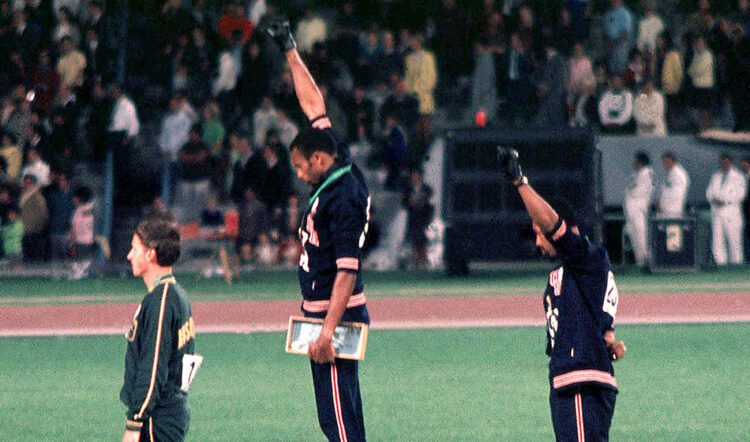While Tommie Smith and John Carlos have become known throughout the world for their black power salute at the 1968 Olympics, the athlete who stood with them in support on the
podium has been less celebrated. In his new book, Doug Levy examines that story
When the moment in time came to decide what was right, Peter Norman chose human rights. Peter Norman? To knowledgeable sports fans, it is a name that will ring the faintest of bells – if it rings one at all. Understandable on one hand, yet sad on the other.
It has been over a half century since he first won acclaim as a guy who could run very, very fast. His story unfolded on October 16, 1968 at the Olympic Games in Mexico City. The fame he received for his 200m silver medal is not the distressing part of his journey. Instead, it’s the sorrowful lack of awareness of his role after the race concluded.
Many people recall, or have heard about, Tommie Smith and John Carlos on the 200m podium, their dark-gloved hands raised skyward in salute to Black power and human rights. Often forgotten or overlooked are Peter’s ideas and actions, depicting him as a civil rights trailblazer who stood with them.
“In a way, his story is more important than Tommie and John’s,” said Matt Norman, Peter’s nephew.
Peter’s story is also a complex one. There is little in dispute about what he did on that October day and why it mattered. The stuff of disagreement lies in what happened to him afterwards, the treatment he received, and how long it took for him to be duly recognised. Sadly, the debate has endured without Peter’s own voice; he died of a heart attack in 2006. It has since been left to others to dissect the details and to determine, in their own minds, whether or how much Peter suffered for his actions at that Mexico City medal ceremony.
In the race itself, Smith won in a world record of 19.83. Peter, brandishing his fearsome finishing kick, took silver in 20.06. Carlos settled for bronze in 20.10.
But to foreshadow the importance of what Peter then did on the walk up to, and on, the podium, it is helpful to dial back to what had preceded those Games. African American leaders had threatened a boycott; after all, racial tensions had boiled in the months since Martin Luther King Jr. had been assassinated in Memphis. While the boycott was called off, civil rights leader Harry Edwards did orchestrate a series of protests to elevate the cause of racial equality at the Olympics.
The plan was for…
CLICK HERE to Read the Full Original Article at Athletics Weekly…

